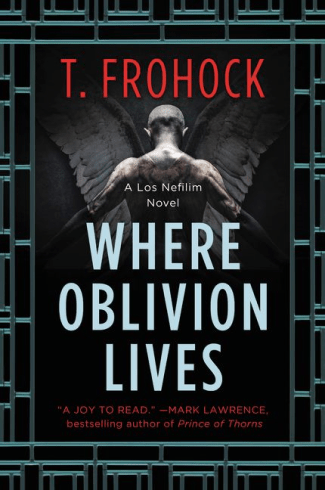The Leaning Pile of Books is a feature where I discuss books I got over the last week—old or new, bought or received in the mail for review consideration (most of which are unsolicited books from publishers). Since I hope you will find new books you’re interested in reading in these posts, I try to be as informative as possible. If I can find them, links to excerpts, author’s websites, and places where you can find more information on the book are included.
It’s been a couple of weeks since one of these posts, mainly because I spent some of that time working on the two posts that went up since the last Leaning Pile of Books feature:
- Review of The Book of M by Peng Shepherd — Although it was overlong and I didn’t love any of the characters, the storytelling, concept, and twist made this post-apocalyptic tale that explores the connection between memory and identity a unique, captivating book that I could hardly stop thinking about after finishing.
- The Gossamer Mage Blog Tour — Julie E. Czerneda discussed new challenges in writing (S.C.T. or “sweaty creative tinkering”) as part of the blog tour for her (very) soon-to-be-released epic fantasy novel The Gossamer Mage—and this also includes some information on how to enter to win signed copies of 18 of her books!
This only covers new arrivals from the last week to prevent it from being a mile long. (I may have bought a few books recently, and my husband may have also gotten a few books that look interesting for me…)
Realm of Ash (The Books of Ambha #2) by Tasha Suri
Realm of Ash, a companion novel to Empire of Sand about Mehr’s sister Arwa, will be released November 12 (trade paperback, ebook).
Empire of Sand, Tasha Suri’s enchanting debut, was my Book of the Year in 2018 so it’s a bit of an understatement to say I was excited when a copy of this unexpectedly arrived a couple of days ago!
A spellbinding fantasy novel set in the Mughal India-inspired world of Empire of Sand, perfect for readers of City of Brass and The Wrath & the Dawn.
Some believe the Ambhan Empire is cursed. But Arwa doesn’t simply believe it — she knows it’s true.
Widowed by the infamous, unnatural massacre at Darez Fort, Arwa was saved only by the strangeness of her blood — a strangeness she had been taught all her life to suppress. She offers up her blood and service to the imperial family, and makes common cause with a disgraced, illegitimate prince who has turned to forbidden occult arts to find a cure to the darkness hanging over the Empire.
Using the power in Arwa’s blood, they seek answers in the realm of ash: a land where mortals can find the ghostly echoes of their ancestors’ dreams. But the Emperor’s health is failing, and a terrible war of succession hovers on the horizon, not just for the Imperial throne, but for the magic underpinning Empire itself.
To save the Empire, Arwa and the prince must walk the bloody path of their shared past, through the realm of ash and into the desert, where the cause of the Empire’s suffering — and its only chance of salvation — lie in wait. But what they find there calls into question everything they’ve ever valued… and whether they want to save the Empire at all.
The Books of Ambha
Empire of Sand
Realm of Ash
Daughters of Nri (The Return of the Earth Mother #1) by Reni K Amayo
Daughters of Nri, Reni K Amayo’s debut novel and the first book in a young adult fantasy series set in ancient Nigeria, will be released on October 1 (hardcover, paperback, ebook, audiobook).
It features gods and separated twins who don’t know their true identities, and it sounds rather intriguing!
A gruesome war results in the old gods’ departure from earth. The only remnants of their existence lie in two girls. Twins, separated at birth. Goddesses who grow up believing that they are human. Daughters Of Nri explores their epic journey of self-discovery as they embark on a path back to one another.
Strong-willed Naala grows up seeking adventure in her quiet and small village. While the more reserved Sinai resides in the cold and political palace of Nri. Though miles apart, both girls share an indestructible bond: they share the same blood, the same face, and possess the same unspoken magic, thought to have vanished with the lost gods.
The twin girls were separated at birth, a price paid to ensure their survival from Eze Ochichiri, the man who rules the Kingdom of Nri. Both girls are tested in ways that awaken a mystical, formidable power deep within themselves. Eventually, their paths both lead back to the mighty Eze.
But can they defeat the man who brought the gods themselves to their knees?
Additional Book(s):
- Kingmaker (The Dragon Corsairs #3) by Margaret Weis & Robert Krammes (Release Date: August 6)





















